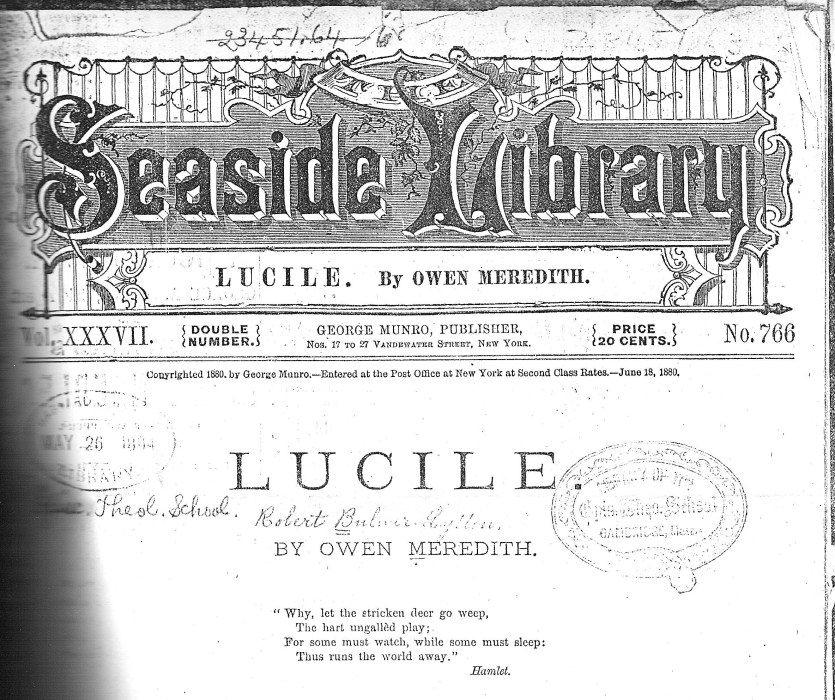PUBLISHER: George Munro, New York, 1868-1893; George Munro and Company, 1864-1868; George Munro's Sons, 1893-1906; George Munro Publishing House, 1906-1908.
ABOUT: The 1870s saw a rapid expansion of cheap book publishing. The lack of an international copyright agreement made it easy to reprint popular English fiction, and by holding the costs to a minimum the reprint house was able to turn a quick profit. Such a venture was the Seaside Library, which Munro began in May 1877 with the publication of Mrs. Henry Wood's East Lynne. The Seaside Library was a series of cheap quartos, often printed two or three columns to a page. Single volumes sold for ten cents, two-volume sets for twenty. Despite strong competition, the Seaside Library quickly dominated the market.... An average of 10,000 copies of each Seaside title were sold. [DLB 49]. By 1883 the overproduction of paperbacks caused such a glut that the American News Company, to cite one instance, returned to Seaside Library 1,200,000 copies it could not sell. Later Munro disposed of 3,000,000 of his unsalable reprints for $30,000 to soap companies which gave a free copy with each bar of soap. [Madison, p54. See also DLB].
Two Canadians who were among the handful of influential and innovative cheap-book publishers after the Civil War were George Munro and John Wurtele Lovell. Munro (1825-96), a benefactor of Dalhousie University, served his apprenticeship on the Pictou Observer, studied theology in Halifax, and arrived in New York in 1856. Within five years he was a partner of Irwin P. Beadle, and involved in dime novel publishing. By 1868 Munro was publishing under his own name, first known for his family paper The New York Fireside Companion and then, after 1877, for the Seaside Library of cheap books, which were issued in a format like pamphlets in order to obtain newspaper postal rates. --[George L. Parker, The Beginnings of the Book Trade in Canada (University of Toronto Press, 1985), p161].
For an 1883 brief biography and a portrait of Munro from The Biographer as well as an entry for Munro written by Oliver Wendell Holmes for the Dictionary of American Biography, click here. Munro was born in 1825; died April 23, 1896. Publisher Norman L. Munro was his brother.
Schurman includes some further information on this company and Shove has nine pages on Munro and the Seaside Library; see research tools. In 1890 Munro leased rights to the Seaside Library to John W. Lovell's attempt to create a monopoly for reprinters; for the decision in an 1896 suit which emerged from that lease, click here.
The Publishers' Weekly. Dec. 14, 1878 \No. 361], page 805: CHEAP LITERATURE IN THE MAILS. (From the N. Y. Sun, Dec. 4th.) / To THE EDITOR OF THE SUN — Sir: A despatch from Washington published in The Sun of Saturday would lead to the impression that the Post-Office Department is decided in a policy hostile to the passage of the Library periodical publications through the mails at the regular rate prescribed by law for such matter. Under a recommendation of the Attorney-General of the United States these cheap periodicals in newspaper form have been hitherto transmitted through the mails at the pound rate of postage with the immediate knowledge and acquiescence of the Postmaster-General. During this .period there has been an unprecedented growth throughout the country of a demand for the highest class of literature, stimulated by the ease and cheapness with which, in its new form, this literature has been made accessible.
Suddenly, on Saturday, November 23d, the publishers of these periodicals were notified of an order instituting an instant change, quadrupling the rate of postage then charged, and flying in the face of precedent and the legal opinion already quoted which had governed the previous action of the department.
Proper representations to Postmaster-General Key procured a suspension of the execution of this order, which was admitted to be at once inconsiderate and unjust. But, like most arbitrary acts, it was not without an adequate motive, which is to be sought in an endeavor to range the Post-Office Department on the side of the new postal registration scheme, which would establish a kind of censorship of the periodical and newspaper press of the country. / GEORGE MUNROE. / 21 Vandewater Street, New York, Dec. 2.
LUCILE’s ISSUED BY George Munro:
Copyrighted 1880. About 210x320mm (double-column magazine format). XXXVII Double Number. Seaside Library No. 766. Price 20 cents. Library of Congress; Harvard: with cover page listing authors represented in the Seaside Library.

This issue is fully digitized in the Northern Illinois University Library Ccollection of Dime Novels.
Last revised: 14 December 2024